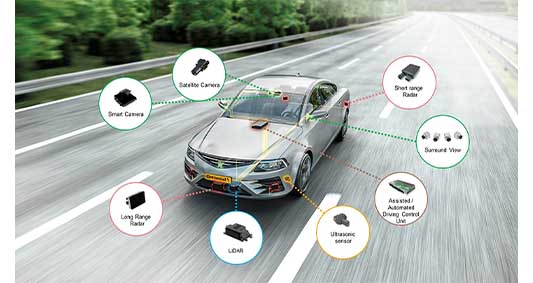The global Automotive ADAS (Advanced Driver Assistance Systems) market is on the fast lane to exponential growth. Forecasts reveal that the market will skyrocket from USD 73.46 billion in 2025 to a staggering USD 217.18 billion by 2034, powered by a 12.8% CAGR. This boom is fueled by government-led road safety mandates, automakers’ heavy investments in sensor technologies, and the rapid emergence of autonomous and electric mobility.
From adaptive cruise control to AI-powered blind spot detection, ADAS is no longer an optional luxury it’s becoming a safety necessity and a stepping stone toward fully autonomous driving.
The New DNA of Automobiles
Modern vehicles are being redefined by a suite of intelligent features designed to enhance safety, efficiency, and comfort. Today’s ADAS solutions span:
- Adaptive Cruise Control (ACC) – ensuring consistent speeds and safer highway travel.
- Blind Spot Detection (BSD) – alerting drivers of hidden dangers.
- Lane Departure Warning (LDWS) – preventing unintended drifts.
- Autonomous Emergency Braking (AEB) – reducing accident severity.
- Tire Pressure Monitoring Systems (TPMS) – improving road performance and fuel efficiency.
- Adaptive Front Lighting (AFL) – enhancing nighttime visibility.
These systems rely on a fusion of sensors, processors, and machine learning algorithms, making vehicles more responsive than ever before.
Why 2025 Is a Defining Year for ADAS
Three major forces are shaping the market’s future:
1. Strategic Collaborations
Automakers are forming alliances with tech giants to co-create futuristic ADAS. Volkswagen’s 2025 partnership with Valeo and Mobileye exemplifies how carmakers are embedding intelligence deep within their platforms.
2. Expanding Production Hubs
Manufacturers are racing to build new facilities for advanced ADAS components. HL Klemove’s new radar plant in Chennai (2024) is a testament to the growing importance of Asia as a production powerhouse.
3. Strong Government Push
Safety mandates are accelerating adoption. In 2025, India made ADAS mandatory for heavy trucks and buses, reflecting a global trend of regulatory enforcement to reduce fatalities.
Market Segments in the Spotlight
Adaptive Cruise Control: Leading the Race
Once a luxury reserved for high-end cars, ACC has gone mainstream. It now dominates the ADAS landscape, with applications stretching from everyday sedans to autonomous trucks. Stellantis’ STLA AutoDrive, launched in 2025, blends ACC with lane-centering, offering a glimpse into the future of semi-autonomous driving.
Blind Spot Detection: The Rising Star
BSD is no longer just a “nice-to-have.” With increasing highway congestion, BSD has become indispensable. VUEWO’s AI-driven blind spot camera system (2025) has raised the bar, making cars smarter and drivers safer.
The Technology Under the Hood
Sensors: The Market Backbone
Sensors hold the largest share, acting as the eyes and ears of ADAS. From radar to LiDAR and ultrasonic sensors, they are integral to precision object detection. Texas Instruments’ radar sensor range (2024) further underscores their growing dominance.
Processors: The Brains Behind Automation
As cars become computers on wheels, processors are evolving to handle the massive data loads. With the rise of SoCs, GPUs, and AI accelerators, the processor segment is growing at breakneck speed. NXP’s S32R47 imaging radar processors (2025) are just the beginning.
Who’s Driving Demand?
Passenger Cars: The Market Leader
Rising global car sales and consumer demand for safety have kept passenger vehicles ahead in ADAS adoption. Horizon Robotics’ SuperDrive platform (2024) is tailored for this booming segment.
Commercial Vehicles: The Fast Follower
Autonomous trucks and fleet automation are rewriting logistics. From mining to long-haul transport, ADAS adoption in commercial vehicles is rising sharply. Maxieye’s Qiantu ADAS (2024) is designed specifically for this growing need.
Regional Growth Stories
North America: The Innovation Epicenter
North America remains at the forefront, thanks to early adoption of self-driving technologies, strong R&D ecosystems, and regulatory backing. Magna and NVIDIA’s 2025 collaboration on AI-powered ADAS further cements the region’s leadership.
Asia Pacific: The Growth Hotspot
Asia Pacific is expected to post the highest CAGR globally, driven by the EV boom, government mandates, and massive investments in R&D. Hyundai Mobis’ new R&D center in India (2025) signals the region’s growing influence in global automotive innovation.
Inside the Value Chain
- Raw Materials: Sourced from global giants like Alcoa, Norsk Hydro, Rio Tinto.
- Testing & Safety: Rigorously monitored by IIHS, NCAP, and NHTSA.
- Distribution: Primarily through OEM integration, with leaders such as Gentex, Denso, Aisin Seiki.
Conclusion: A Safer, Smarter Tomorrow
The Automotive ADAS market is not just about technology it’s about transforming mobility into a safer, smarter, and more sustainable ecosystem. With 12.8% CAGR growth projected through 2034, ADAS is set to redefine how we drive, commute, and transport goods.
From North America’s innovation leadership to Asia Pacific’s growth momentum, the global race to smarter mobility is accelerating and ADAS is in the driver’s seat.
About the Author: Ajit Bansod is a skilled and research-driven analyst at Towards Automotive, with over 3 years of experience specializing in the intersection of automotive innovation and intelligent communication technologies.













